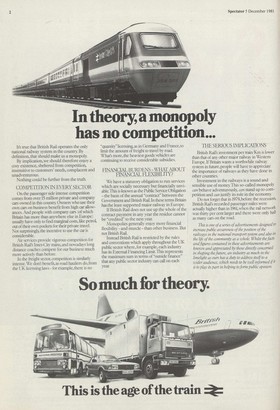In theory, a monopoly has no competition...
true that British Rail operates the only national railway system in the country By definition, that should make us a monopoly.
By implication, we should therefore enjoy a cosy existence, sheltered from competition, insensitive to customers' needs, complacent and unadventurous.
Nothing could be further from the truth.
COMPETITION IN EVERY SECTOR
On the passenger side intense competition comes from over 15 million private and company cars owned in this country Owners who use their own cars on business benefit from high car allowances. And people with company cars (of which Britain has more than anywhere else in Europe) usually have only to find marginal costs, like petrol, out of their own pockets for their private travel. Not surprisingls the incentive to use the car is considerable.
Air services provide vigorous competition for British Rail's Inter-City trains, and nowadays long distance coaches compete for our business much more actively than before.
In the freight sector, competition is similarly intense. We don't benefit,as road hauliers do, from the UK licensing laws for example, there is no "quantity" licensing, as in Germany and France, to limit the amount of freight to travel by road. What's more, the heaviest goods vehicles are continuing to receive considerable subsidies.
FINANCIAL BURDENS -WHAT ABOUT FINANCIAL FLEXIBILITY?
We have a statutory obligation to run services which are socially necessary but financially unviable.This is known as the Public Service Obligation the basis of the annual "contract" between the Government and British Rain these terms Britain has the least supported major railway in Europe.
If British Rail does not use up the whole of the contract payment in any year the residue cannot be "credited" to the next year.
Monopolies generally enjoy more financial flexibility and muscle than other business. But not British Rail.
Instead British Rail is restricted by the rules and conventions which apply throughout the UK public sector where, for example, each industry has its External Financing Limit.This represents the maximum sum in terms of "outside finance" that any public sector industry can call on each year.
THE S1'.RIOUS IMPLICATIONS
British Rail's investment per train/Km is lower than that of any other major railway in Western Europe. If Britain wants a worthwhile railway system in future, people will have to appreciate the importance of railways as they have done in other countries.
Investment in the railways is a sound and sensible use of money. This so-called monopoly can behave adventurously, can stand up to competition and can justify its role in the economy.
1)o not forget that in 1979,before the recession, British Rail's recorded passenger miles were actually higher than in 1961, when the rail network was thirty per cent larger and there were only half as many cars on the road.
This is one of a series of advertisements designed to increase public awareness of the position of the railways in the national transport system and also in the life of the community as a whole. Whilst the facts and figures contained in these advertisements are known and appreciated by those directly concerned in shaping the future, an industry as much in the limelight as ours has a duv to address itself to a wider audience, which needs to be well informed jit is to play its part in helping to form public opinion.










































 Previous page
Previous page